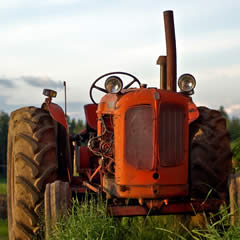Fun Facts About Tractors - Vol.249
The humble tractor has been helping farmers complete their work more efficiently for decades. Offering high levels of torque that allow the operator to tow heavy trailers and machinery that are needed for their line of work, tractors were something of a revolution in the agricultural industry and it is rare to find a farm today that doesn't have at least one in its garage.
Of course, many road drivers will have also experienced some of the less advantageous aspects of tractors, especially if they have been caught behind one on a long and winding country road. Still, these remarkable machines are vehicles that are built to a specific purpose, which makes some of the following fun facts about tractors even more astonishing.

The Fastest Tractor Can Exceed Speeds of 100kmh
Tractors, as mentioned above, are hardly known for being able to reach high speeds. In fact, doing so can be damaging to the job that they are intended to do. In fact, with a standard tractor, trying to push the vehicle beyond its limits can often lead to issues, such as the frame becoming unstable and potentially tipping over.
That makes it all the more astonishing that the land speed record for a tractor is 121kmh, which is a speed some lower grade cars can have trouble achieving. The feat was achieved by a Russian driver named Sergey Sukhovenko back in 2012. He had customized a 25 year old Belarus Tractor, upgrading a number of aspects of the vehicle including its engine and fuel injection capacities.
One trip over a particularly icy lake later and Sukhovenko had achieved the fastest speed any tractor had traveled at. Imagine trying to tend crops going at these sorts of speeds.
Metal Wheels
Rather astonishingly early tractors, especially those that were used in the 1930s, featured metal wheels instead of the enormous tires that we see on tractors today. While advances in technology has seen a wide array of extremely effective tires being used on modern day tractors, tractors from this earlier era were wholly dedicated to being used on farmland.
Tractors with steel wheels were commonplace on farms from the 1930s, with the wheels being laden with metal plates and spikes that achieved the level of traction required to make them usable. Of course this also meant that the tractors couldn't be used on the road, which might be seen as a positive by some road users today.
Millions of Tractors
If you need any further evidence of just how influential tractors have become to the world at large you need only see the statistic that there are currently believed to be as many as 16 million tractors in operation on the planet as we speak. That is an enormous amount of vehicles all dedicated to a specific purpose.
Furthermore, because of the sheer volume of tractors on the planet it is believed that as much as one third of all the energy that is used in farming and agricultural production today is used by tractors, demonstrating just how valuable they are to the modern farmer. It makes you wonder just how much energy would be used if not for these amazing vehicles.
Origins of the Word
Perhaps unsurprisingly the root of the word "tractor" can be traced back to Latin, just like many other words in the English language. It comes from the word "trahere" which literally means to pull. A number of other words share a similar etymology, including the word traction, and it is perhaps fitting that such a literal definition of what a tractor is intended to do be used to name the vehicle.